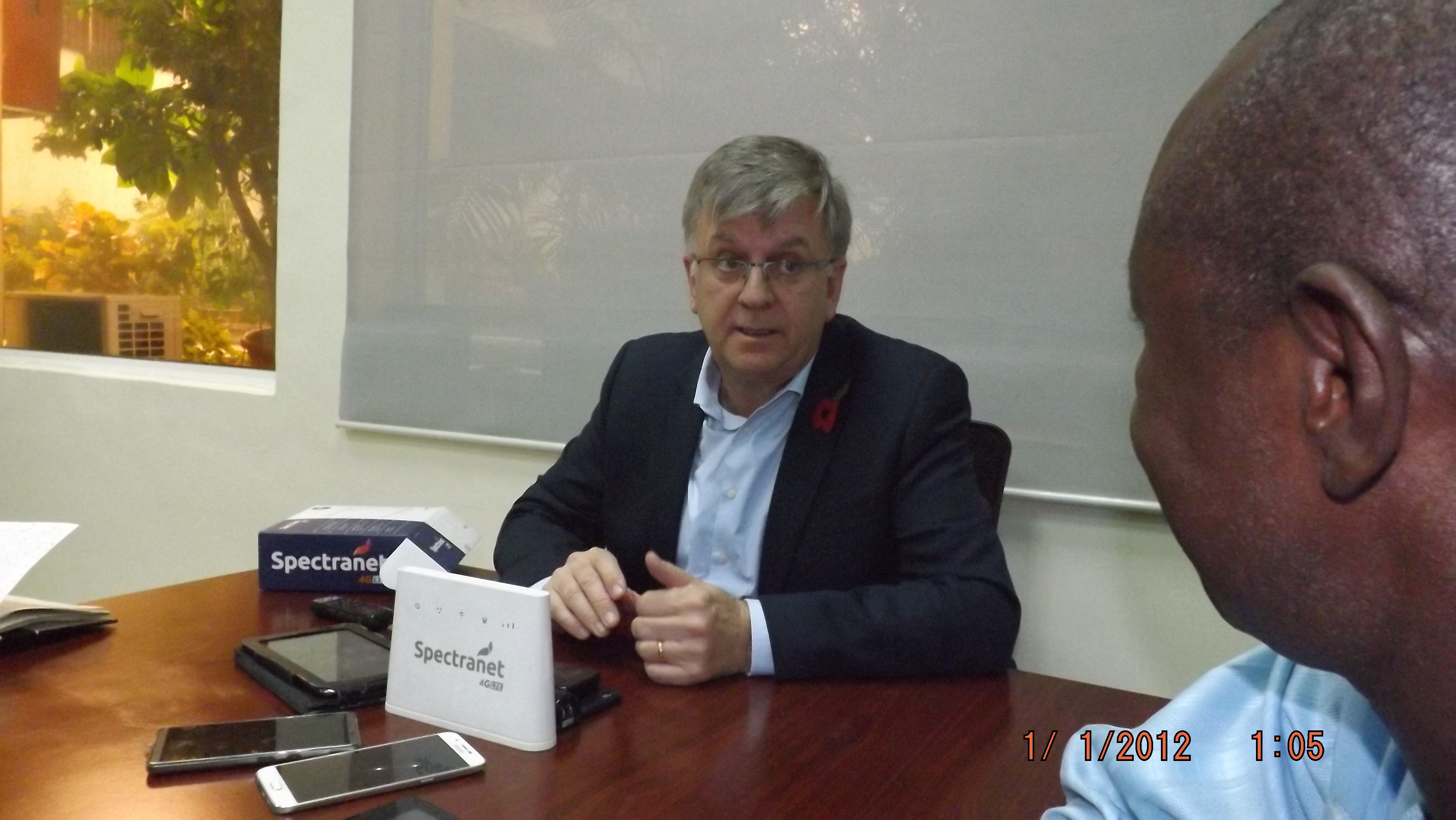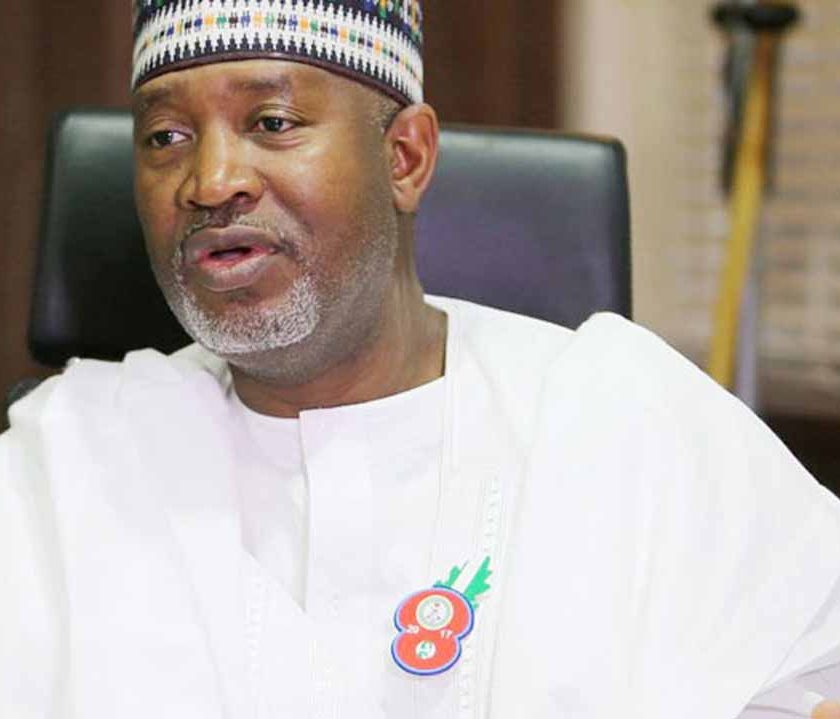David Venn, a Briton, is the CEO of Spectranet Nigeria with over 30 years industry experience garnered in course of leading highly competitive businesses in the telecommunication industry. He is widely traveled and has a reputation for turning around complex telecommunications businesses and has held Chief Executive positions with top telecom brands which include; Vodafone, Celtel (Zain), London Interconnect, Augere (Middle East, Pakistan & Bangladesh) in addition to senior positions at Cable & Wireless, Optus Communications and Startec (USA). He is known for his creative and innovative approach and for his vast experience operating in emerging markets. Mr Venn has a Masters in Business Administration from Ashridge Management College, a Bachelors degree in Telecommunications Engineering and has attended numerous leadership programs at London Business School. In this interview with National Infinity’s Editor-In-Chief, Olajide Ige, he shares his experience on his journey across Africa’s telecoms market, the ‘data war’ among Nigerian Operators and how the impression he had about Nigeria changed. The interview took place at the company’s headquarters located in Oregun
Can I get to know you?
David Ben; I’m the chief executive of Spectranet Ltd. Just so that you will know, Spectranet is only here in Nigeria. We don’t have companies in South Africa or the Middle East. I have personally been in the telecommunications industry for a very long time; 35 years. I left school in John British telecom as an engineer and I have lived and worked all over the world and as the telecommunications industry has developed, I have developed and grown with it. So, I have worked in lots of markets including Asia and a number of markets in Africa as well; I was in Zambia for 7 years, Ghana for 2 years as well as America for 5 years, in the Middle East and Asia. I have worked in all of continents. But as I have done that, technology has developed and here I am in Nigeria with one of the latest sought technologies, 4G companies. I have always worked in competitive markets; I’m not the sort of person that will be in a big huge company, I like competition. I like serving customers and winning customers, which is what we are doing here. So that’s me, I have been here for 2 years. I was brought in by the shareholders to take the company to the next level. It was doing quite well, smaller and little known about two years ago and if you cast your mind back to the previous government days, how many people would have heard or known about Spectranet? But now, almost everyone knows it. It’s a brand that has come up in the past two years. Everyone knows who we are and what we do. So that’s one of the changes we were able to make with the team; to get out there and push the brand forward and make sure we serve as many customers as possible.
Alright, you’ve been here for 2 years so you can as well speak for Spectranet. It wouldn’t be out of place if we ask, what is Spectranet?
So, Spectranet is a private company and we have about 600 employees spread across the different cities that we service. So we provide good quality and at the right price, broadband to customers. We are not a mobile phone company. We don’t offer phones or voice services. We offer data and the internet and basic broadband. It’s really targeted at the home and the office. We are not talking about the big corporations; we are talking about people’s homes if they want broadband for their family, and also the small to medium size enterprises. So that’s our market, that’s what we do. It’s good quality broadband. So we do that in Lagos, Abuja, Ibadan and Port Harcourt at the moment. We launched at Port Harcourt earlier this year before the dollar crisis really hit in terms of the economy and stuff. We managed to get the equipment in there and do that. So we’ve got four cities. Our main market is Nigerian Families that want to have broadband in their home with Wi Fi for the whole family to use, and not just browsing, they use it for entertainment, for TV where there is YouTube or Netflix or general use of the internet.
Also you can use it for email, gaming, Facebook, Skype, all things that the family will use it for. So what we provide is a modem; put it in the house, its connected to 4G, it picks up our signal, then it all casts Wi-Fi allover your house. That’s the main thing we offer. We don’t really go for mobility, but we do have Mi-Fi devices as well; the pocket modems. So, you can take them with you if you have data with you where we’ve got coverage. So I do that when I come to work every day. I’ve got Mi-Fi in my car.
This is the bigger one; this is the one for the home. This comes with a twelve hour battery. So if the power goes out, the home internet still works. So, if I am watching Netflix at home, I got a UPS for my TV. If the power goes out, I still sit down and watch the TV, nothing changes. The lights go out, but the TV doesn’t. So these come with twelve hours of battery. The MiFis; they’ve made different types. We’ve seen our competitors have these sorts of things as well. So put that in your car and you’ve got broadband in your car. So again, on the way home, I can watch Netflix, watch a movie, watch TV series; which I do on the way back to Ikoyi from here, takes half an hour. I watch on my mobile phone. When I get home as well, it logs on to the modem, it logs on to the Wi Fi. That actually in terms of lifestyle, is changing everything. A lot of people now are watching video, entertainment, much more than they used to. Two years ago, if you got a video; someone sent you a Facebook massage with a video on it, most people will delete it. That is the practice here, because you don’t want to consume your data bundle. Now, it plays automatically; you don’t even touch it. It starts to play and people watch it; people watch more videos on YouTube as well. People get a lot of content on YouTube and they actually watch it on their phones. And that’s the major challenge in the last two years in Nigeria.
You’ve spoken about 3G, 4G, and we have 4G LTE, you see, the problem is that most consumers don’t know the difference; because it’s like the average speed is not even up to 3G and now we are talking about 4G LTE, there is this general shift, most people are not educated ICT wise and they have very little knowledge of 3G, 4G or 4GLTE, they can’t even meter the speed. You see a situation whereby a company will claim to be offering 4G but they aren’t. So what is your company doing in this regard? How many companies are offering 4GLTE?
There was a conference last year, in Abuja; an IT conference. I was asked to speak there; I was asked to give a presentation on the difference between 3G and 4G. I explained exactly what the difference is. There is quite a lot, but customers don’t care whether it is 3G or 4G, it is ‘do I have good internet?’, ‘is it good?’, ‘is it fast?’.
Just in summary, 3G was designed as a voice network with good data. When you design a 3G network, you make most of your money out of voice phone calls, because that’s what people pay for. The mobile operators make a lot of money out of voice phone calls. They don’t make that much money out of data, not because data is not used very much, but because per megabyte of network capacity, they’ll make back 100 times more of revenue from voice call than they will for data call. Data is quite cheap. So this is one of the reasons why the mobile operators don’t really have data everywhere. If data is everywhere, they are going to start using WhatsApp and Skype and they are going to stop using the voice networks; they are going to stop paying for voice calls. I’ve said in quite a few times in conferences mostly in Nigeria that in the next couple of years; maybe 2 or 3 years, no one is going to pay for voice. They will just be buying data bundles. That’s what happens now in Europe. In the UK, I’ve got five SIM cards on one network; that’s for my family. We work on the same plan. I have a 10 Gig plan. So I can use 10 Gigs per month. I pay a certain amount for that on all five SIM cards; it’s all shared. All the phone calls and SMS are free, unlimited. I don’t pay for any phone calls in the UK. MTN makes $200 million per month on voice phone calls. The last thing they want is all that to go to WhatsApp. A 3G network takes data and voice and handles voice. But you have to configure it as to how much capacity you configure for voice and how much do you configure for data. So you can be full on data, congested and still have space for voice if you set it up that way. So, if you are making hundred times more revenue from voice call, you’ve got to make sure as much as you can, that doesn’t get congested. Because if you make 1 percent from of revenue from data, it doesn’t mean it should be congested.
4G is different. 4G is all data, and actually putting voice over 4G is a new thing. You’ve seen that some of our competitors have launched voice over LTE. That’s actually special because LTE wasn’t designed for this, it was designed for data. It’s designed so that you can use any voice app you want on your data, to do a voice call. But some people, mobile phone companies want to have voice over LTE to make it look like a mobile phone. So, Long Term Evolution or LTE is designed for data. Some of the old technologies that happened between 3G and 4G; things like WIMAX, you might have heard of some of these old technologies. The operators used to call that 4G because it wasn’t 3G. So they called it 4G, but it’s not actually really 4G; it’s not fast enough, the speeds are quite slow. That’s why in Nigeria, the new operators that want the latest technology call it 4GLTE. What that means is, that is the standard for what is proper 4G. The idea is, there is a specification that says this is what 4GLTE should deliver, not today, but the plan is, it evolves over the next ten years. So, the specification says you should be able to get 100 megabytes per second of speed when you are mobile and you should be able to get 1 gigabyte of speed when you are static. This is the standard. No one does it yet but this is the plan, and as 4G LTE evolves, it gets upgraded, that’s when we will reach.
So, you can imagine there’s nothing like 3G. 3G, take in Nigeria with my experiences; it’s awful. Some places, you do speed test and get a good speed, the 3G is working well and you move on down the road, you’ve got nothing. That’s 3G; you got signal here, no signal there. 4G is different. 4G is data everywhere, and its continuous data. The 4G spec that says you are going to get 100 megabytes speed when you are mobile, also says that when you are mobile, you have to be doing 150 miles an hour on an high speed train. That’s what they call mobile. So at the moment, what you will get with a 4G network is probably anything from a few megabytes if you haven’t got a good signal; if you are in a bad area, if you are inside a building; lots of walls, possibly 40 or 50 megabytes. I think, even coming to the office in the morning, I ran a speed test going past Osborne estate which is on the main road coming from Ikoyi. I got 35 to 38 megabytes. Some times on 3G, you might get a few megabytes; maybe 8 megabytes, 9 megabytes, but it’s so inconsistent; you can’t rely on that. In a lot of cases in Nigeria, you don’t get 3G. You may get in Lagos,m but you go elsewhere, you don’t get a 3G signal.
How is Spectranet coping with all these competitions from GSM companies?
Well, there is almost a hundred million internet users in Nigeria. NCC gave the numbers out; it’s 96 million. Most of those people are using 3G, almost all of them. 95 percent of them are using 3G. That’s our competition. We’ve got competitors; there is a couple of competitors that have got 4G as well. There are a few new guys like MTN; they got 4G; they just started, Glo is talking about getting it. We know that in time, everyone is going to have 4G; it’s not going to be exclusive to us. We only operate 4G network and we only provide data at Spectranet. We don’t do voice, we don’t do 3G. I’m going to a conference next week in Cape Town and I’m speaking in the conference. One of the sessions I am speaking in is migration from 2G to 3G then to 4G; how are people coping? My response is, you don’t need to migrate if you haven’t got it, you just jump in. you leap straight into the latest technology. But then, you can cause disruption. Because the problem is, if you are migrating from one to the other, apart from the technical issues, you’ve got all these legacy and stuff; you don’t want to lose all your 3G customers, because you’ve paid for that; you’ve invested in all that technology, you don’t want to throw it away. And also, you don’t want it to be sitting there idle. You want it to be earning revenue all the time. So when you introduce a new technology like 4G, you tend to be; if you are a mobile operator, you will be very careful of how you do this. You don’t want to come in and be disruptive, because you will damage your own existing revenue string. If you haven’t got existing revenue strings, you don’t care about that. So that’s why I’m happy to say phone calls should be free; because I haven’t got any phone revenue. But for MTN; that shouldn’t be allowed, that shouldn’t be legal because they are trying to protect their revenue, obviously. So, when it comes to competition, there is a few 4G operators around that got a small part of the market at the moment. There is a few; very small number of cable operators that are actually cleaning up the communities. Again, there is a very small percentage of people that have got broadband and fiber and that will be the case for a very long time in Nigeria. So the majority of people on the internet are on 3G. You are right; a lot of people don’t know the difference between 3G and 4G and one of our biggest challenges is to get people to try it.
That’s why, these modems I got here, I lend these out to people, lot of people. I tell them to take it, it’s loaded; it’s got credit on it. Try it for a couple of weeks, if you like it, go and buy one. Everyone goes out and buys it. Once you’ve tried it, you realize it works very well and you can’t go back to 3G. It’s a very different experience. So, one of our challenges is getting people to try it because people don’t understand the difference between 3G and 4G and for a lot of people, their only experience on the internet is 3G. That’s what they are used to. They are not used to watching Netflix on a big TV screen on high definition. They are used to; if any video at all, they are used to looking at it on their mobile phone, they just look at little pictures. It is fine if you are on the move. But when you are home; if you want to watch a big motion picture, movie on HD on a nice big TV; a lot of people have nice TVs here; because everyone goes for nice brands, you need a good internet connection. I’ve got DSTV at home; multichoice. I never, ever watch it. I need to get rid of it, because I’ve got one of these and I watch Netflix, I watch apple TV and everything I watch is HD, because Netflix has all its contents in HD as well. And when it comes up on your screen, it’s in HD. If I flip back to Sky News; which is on DSTV, it’s less in quality. The quality on satellite is not good. Even if it is HD, it’s still not that good. I flip back just by changing it and it’s a very different experience and I tell my wife, ‘we need to get rid of this DSTV’, because I don’t watch it. Even now, streaming; which is what we have on the internet, I can get Sky News live. But also, the way it comes up on the menu is, all the stories of today that are on the news are there as clips; one minute clips, or you can watch live.





